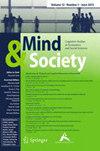Deep Sustainability: The UN Sustainable Developmet Goals versus the Unworkable UN System
Q1 Arts and Humanities
引用次数: 1
Abstract
Deep Sustainability refers to integration of human beings into the biosphere of planet Earth through a fundamental transformation of culture, spirit, and civilization, including our ways of doing science, business, education, and commerce. The latest assessment of our planetary environmental situation by scientists and environmental experts paints a frightening picture of the consequences should we fail to reach such a deep level of sustainability. Many of the SDGs such as ending poverty and converting civilization to sustainable extraction production, consumption, transportation and disposal are on the mark, but we have seen that they cannot be achieved under the unworkable UN system. Change the design of the system and you change the likely consequences of the system. It is as simple as that—and as profound as that. The Constitution for the Federation of Earth is a blueprint for human survival and flourishing. It is very brief, concise, and clearly designed. We can replace the unworkable UN Charter with the Earth Constitution and integrate all the valuable agencies of the UN into the emerging world federation. This is the way forward for humanity. Indeed, it is the only way to survive as a species within the limited time-frame available to us. Deep sustainability means real transformation of a broken world system. Deep sustainability means human coherence and synergy for truly addressing our most fundamental problems. Deep sustainability means ratifying the Constitution for the Federation of Earth.深度可持续性:联合国可持续发展目标与不可行的联合国系统
深层可持续性指的是通过文化、精神和文明的根本转变,包括我们从事科学、商业、教育和商业的方式,使人类融入地球生物圈。科学家和环境专家对地球环境状况的最新评估描绘了一幅可怕的画面,如果我们不能达到如此深层次的可持续性,后果将不堪设想。消除贫困、实现文明向可持续开采、生产、消费、运输和处置转变等许多可持续发展目标都是正确的,但我们已经看到,在不可行的联合国体系下,这些目标是无法实现的。改变系统的设计,你就改变了系统可能产生的后果。道理就这么简单,也这么深刻。地球联邦宪法是人类生存和繁荣的蓝图。它非常简短,简洁,设计清晰。我们可以用《地球宪法》取代行不通的《联合国宪章》,并将联合国所有有价值的机构整合到新兴的世界联盟中。这是人类前进的方向。事实上,这是作为一个物种在有限的时间内生存下来的唯一途径。深度可持续性意味着对破碎的世界体系进行真正的变革。深度可持续性意味着人类的一致性和协同性,以真正解决我们最根本的问题。深度可持续性意味着批准《地球联邦宪法》。
本文章由计算机程序翻译,如有差异,请以英文原文为准。
求助全文
约1分钟内获得全文
求助全文
来源期刊

Mind and Society
Arts and Humanities-Philosophy
CiteScore
2.30
自引率
0.00%
发文量
5
期刊介绍:
Mind & Society is a journal for ideas, explorations, investigations and discussions on the interaction between the human mind and the societal environments. Scholars from all fields of inquiry who entertain and examine various aspects of these interactions are warmly invited to submit their work. The journal welcomes case studies, theoretical analysis and modeling, data analysis and reports (quantitative and qualitative) that can offer insight into existing frameworks or offer views and reason for the promise of new directions for the study of interaction between the mind and the society. The potential contributors are particularly encouraged to carefully consider the impact of their work on societal functions in private and public sectors, and to dedicate part of their discussion to an explicit clarification of such, existing or potential, implications.Officially cited as: Mind Soc
 求助内容:
求助内容: 应助结果提醒方式:
应助结果提醒方式:


